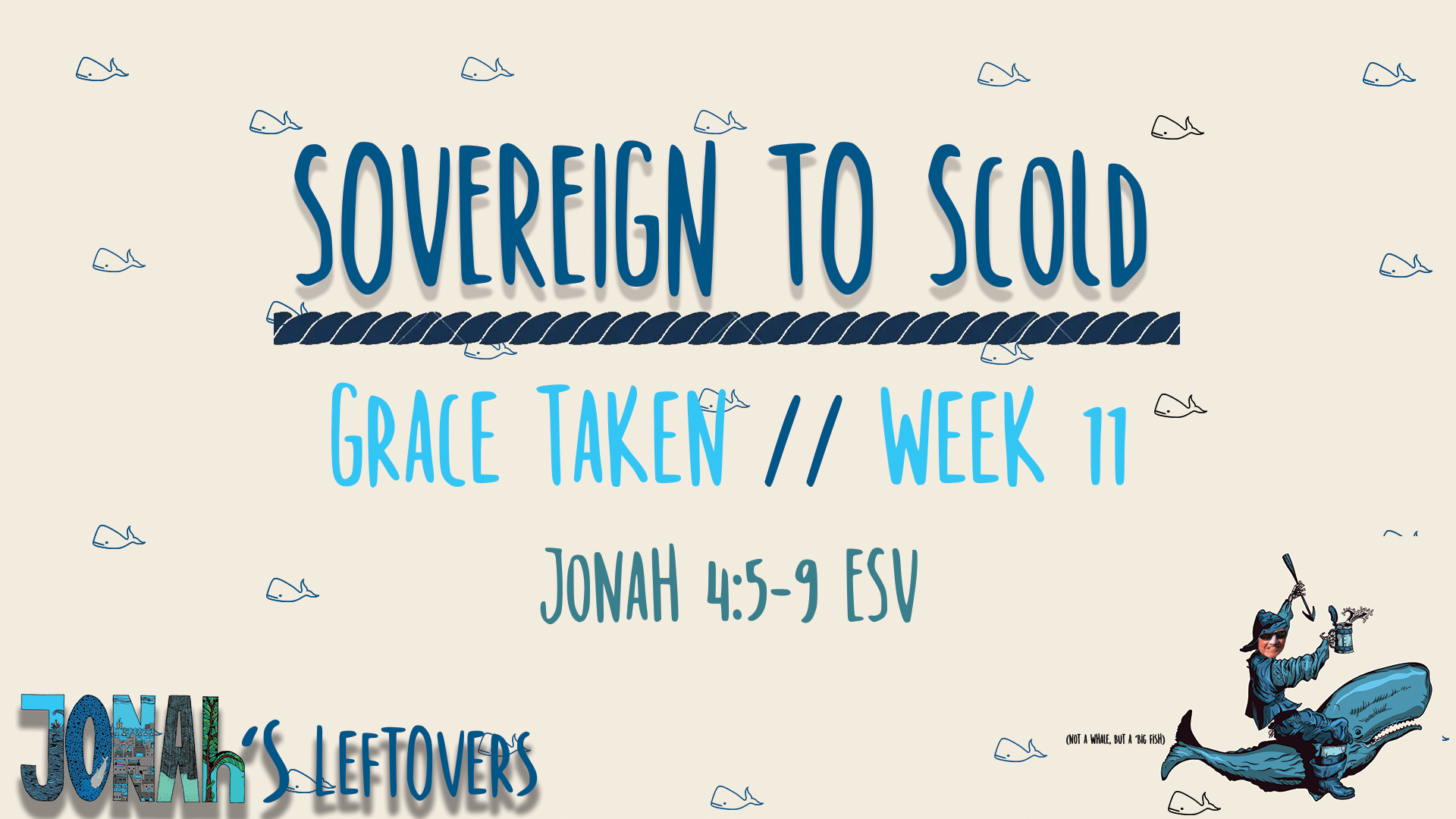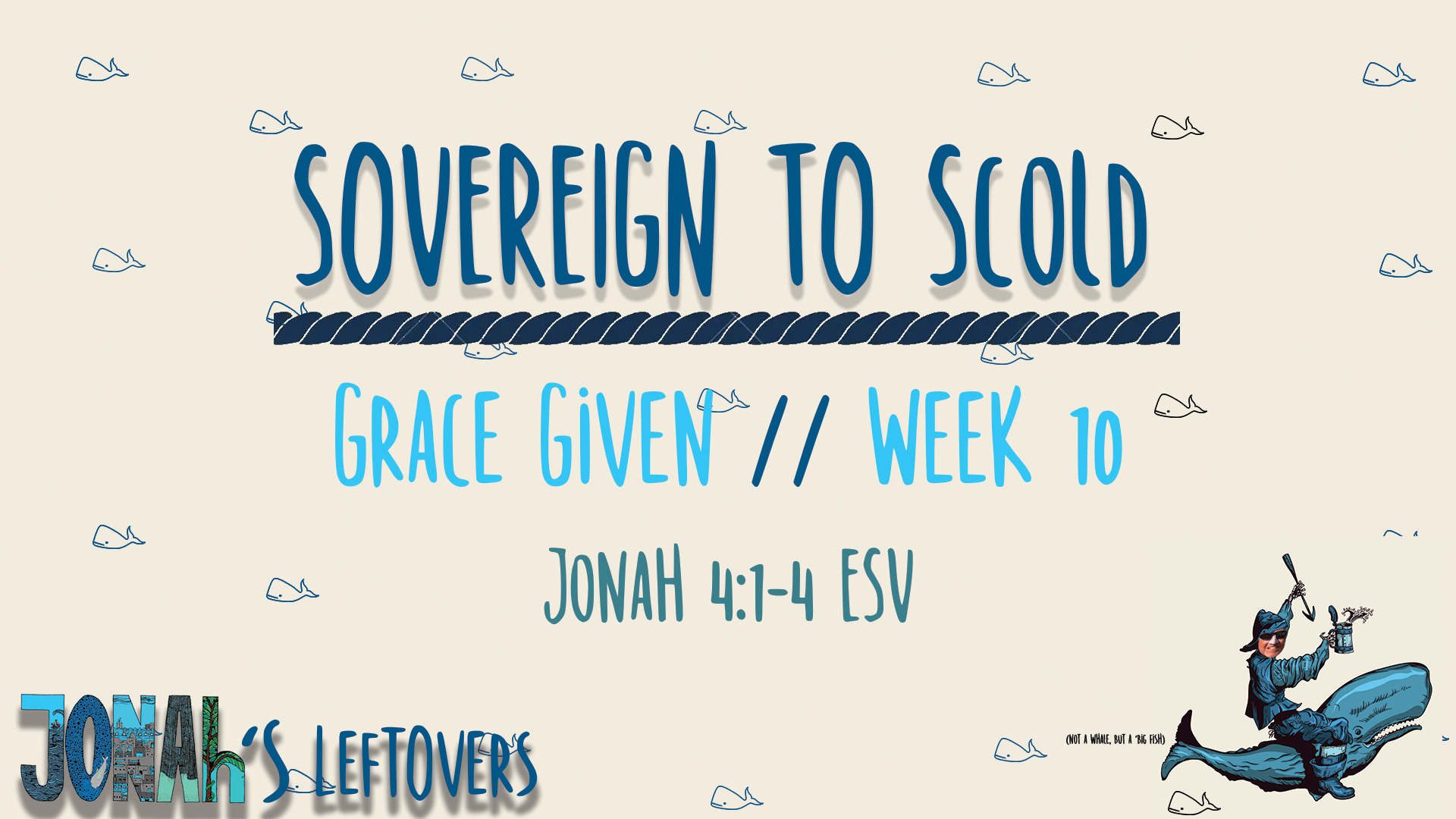Home » Jonah’s Leftovers // Jonah 1:4-16
Jonah’s Leftovers // Jonah 1:4-16

Sovereign To Send // The Storm
"4But the Lord hurled a great wind upon the sea, and there was a mighty tempest on the sea, so that the ship threatened to break up. 5Then the mariners were afraid, and each cried out to his god. And they hurled the cargo that was in the ship into the sea to lighten it for them. But Jonah had gone down into the inner part of the ship and had lain down and was fast asleep. 6So the captain came and said to him, “What do you mean, you sleeper? Arise, call out to your god! Perhaps the god will give a thought to us, that we may not perish.” 7And they said to one another, “Come, let us cast lots, that we may know on whose account this evil has come upon us.” So they cast lots, and the lot fell on Jonah. 8Then they said to him, “Tell us on whose account this evil has come upon us. What is your occupation? And where do you come from? What is your country? And of what people are you?” 9And he said to them, “I am a Hebrew, and I fear the Lord, the God of heaven, who made the sea and the dry land.” 10Then the men were exceedingly afraid and said to him, “What is this that you have done!” For the men knew that he was fleeing from the presence of the Lord, because he had told them. 11Then they said to him, “What shall we do to you, that the sea may quiet down for us?” For the sea grew more and more tempestuous. 12He said to them, “Pick me up and hurl me into the sea; then the sea will quiet down for you, for I know it is because of me that this great tempest has come upon you.” 13Nevertheless, the men rowed hard[a] to get back to dry land, but they could not, for the sea grew more and more tempestuous against them. 14Therefore they called out to the Lord, “O Lord, let us not perish for this man's life, and lay not on us innocent blood, for you, O Lord, have done as it pleased you.” 15So they picked up Jonah and hurled him into the sea, and the sea ceased from its raging. 16Then the men feared the Lord exceedingly, and they offered a sacrifice to the Lord and made vows." ~Jonah 1:4-16 ESV
BACKGROUND
VERSE 4
But the Lord hurled a great wind upon the sea, and there was a mighty tempest on the sea, so that the ship threatened to break up.
It's all "great"
VERSE 5
Then the mariners were afraid, and each cried out to his god. And they hurled the cargo that was in the ship into the sea to lighten it for them. But Jonah had gone down into the inner part of the ship and had lain down and was fast asleep.
He's going down for real
VERSE 6
So the captain came and said to him, “What do you mean, you sleeper? Arise, call out to your god! Perhaps the god will give a thought to us, that we may not perish.”
SLEEPING ON SALVATION
~“Brother, we walk with Jesus” – but you can also walk in your sleep.
~“Sister, we have passion for Jesus! I just cried in worship the other day.” – but you can cry in your sleep.
“Friend, we have joy and rejoice in Jesus.” – but you can laugh in your sleep.
~“Hey, I think about Jesus all the time.” – but you can also think while you are asleep; we call it dreaming.
Jonah would have to “wake up,” to answer the call of the ship captain to save them all that they “may not perish.” Church this is the heart of our God, that “none would perish but all have everlasting life (cf. John 3:16),” yet not all are WOKE to this call of Christ.
VERSES 7+8
And they said to one another, “Come, let us cast lots, that we may know on whose account this evil has come upon us.” So they cast lots, and the lot fell on Jonah. Then they said to him, “Tell us on whose account this evil has come upon us. What is your occupation? And where do you come from? What is your country? And of what people are you?”
JONAH'S THE SOURCE OF THE STORM
VERSES 9-10
And he said to them, “I am a Hebrew, and I fear the Lord, the God of heaven, who made the sea and the dry land. Then the men were exceedingly afraid and said to him, “What is this that you have done!” For the men knew that he was fleeing from the presence of the Lord, because he had told them.
Jonah confesses: WHO he iS & WHAT He's DONE
VERSE 11
Then they said to him, “What shall we do to you, that the sea may quiet down for us?” For the sea grew more and more tempestuous.
THE SAILORS CONFESS: What can we do?
VERSE 12
He said to them, “Pick me up and hurl me into the sea; then the sea will quiet down for you, for I know it is because of me that this great tempest has come upon you.”
GET RID of ME & SAVE YOURSELVES
VERSE 13
Nevertheless, the men rowed hard to get back to dry land, but they could not, for the sea grew more and more tempestuous against them.
Good Things or God things?
This is a reminder for us that even “good,” things aren’t always “God,” things in our lives. And whilst the sailors believed they were doing a “good thing,” “rowing harder,” they were actually “rowing against,” the will of God; and as a result the sea only got rougher for them.
VERSE 14
Therefore they called out to the Lord, “O Lord, let us not perish for this man's life, and lay not on us innocent blood, for you, O Lord, have done as it pleased you.”
A REVERSAL OF ROLES
VERSE 15
So they picked up Jonah and hurled him into the sea, and the sea ceased from its raging.
THE SAILORS SURRENDER & THE STORM STOPS
VERSE 16
Then the men feared the Lord exceedingly, and they offered a sacrifice to the Lord and made vows.
Jesus, AGAIn THE GREATER JONAh!
SUMMARY
- When the storm first comes, the sailors are “afraid and each called out to his own god.” (1:5)
- When they hear who Jonah’s God is, they become “greatly afraid” (In 1:10; unfortunately the NIV + ESV translates this as ‘terrified’ – so that we English readers miss the progression of fear).
- After showing reluctance to take someone’s life, they throw Jonah overboard and the sea grows calm. And they now truly understand who this God is and we end the chapter with them not only being “greatly afraid” but offering sacrifices and making vows to YHWH, becoming true worshippers (1:16). It’s a conversion – heart change with lifestyle change.)
Have you downloaded The app?!
Check out your unique God-wiring
CHURCH IS MORE
than sunday

Jonah’s Leftovers // Jonah 4:10-11

Jonah’s Leftovers // Jonah 4:5-9


